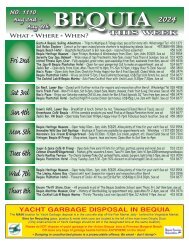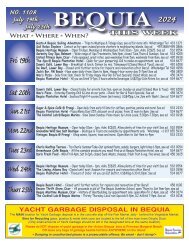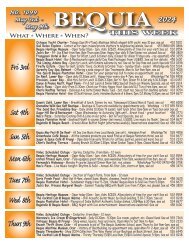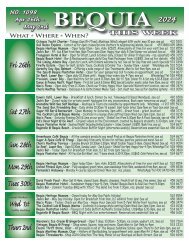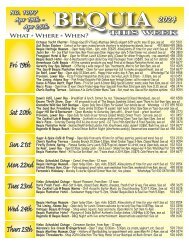Caribbean Compass Yachting Magazine - April 2021
Welcome to Caribbean Compass, the most widely-read boating publication in the Caribbean! THE MOST NEWS YOU CAN USE - feature articles on cruising destinations, regattas, environment, events...
Welcome to Caribbean Compass, the most widely-read boating publication in the Caribbean! THE MOST NEWS YOU CAN USE - feature articles on cruising destinations, regattas, environment, events...
Create successful ePaper yourself
Turn your PDF publications into a flip-book with our unique Google optimized e-Paper software.
— Continued from previous page<br />
This training course was funded by the St Vincent &<br />
the Grenadines Conservation Fund.<br />
The Tobago Cays Marine Park.<br />
Six staff members are now certified<br />
to conduct biophysical monitoring.<br />
Visit www.tobagocays.org and facebook.com/<br />
tobagocaysmarinepark for more information.<br />
Waste to Art contest winners announced<br />
Lystra Culzac reports: Environmental Protection in<br />
the <strong>Caribbean</strong> and Science Initiative for Environmental<br />
Conservation and Education have announced the<br />
winners of their Waste to Art competition held under<br />
the theme “Amazing Seabirds: Our Birds, Our Islands,<br />
Our Future.” The contest was held throughout St.<br />
Vincent & the Grenadines and Grenada in four<br />
categories: Primary Schools, Secondary Schools,<br />
Tertiary Schools and Adults. This contest was an<br />
opportunity for students and the general public to<br />
bring attention to the threat of marine litter to wildlife<br />
and showcase their creativity and knowledge about<br />
seabirds. At the same time, they contributed to a<br />
cleaner and healthier environment by removing<br />
plastics and other waste material from beaches and<br />
seabird habitats.<br />
Darell Lewis from Grenada received first prize in the<br />
Tertiary Schools category.<br />
Twenty-six online entries were judged by a panel of<br />
environmentalists, media personnel and professional<br />
artists. Cash prizes will be awarded to the two top<br />
entries in each category.<br />
First place in the Primary Schools category was<br />
awarded to Kyle Salhab and Zariel Thomas of<br />
Grenada, who used styrofoam, wire, and newspaper<br />
to depict a seashore environment. Second place went<br />
to Allen Lowmans of St. Vincent, who displayed a<br />
Red-Billed Tropicbird.<br />
Secondary school winners were Annique Patterson of<br />
St. Vincent (first place) with the piece “DND” (Do Not<br />
Disturb), which demonstrates the danger to seabirds<br />
of eating plastic, and Janessa Durham of St. Vincent<br />
(second place), who depicted a Least Tern.<br />
In the Tertiary Schools category, Darell Lewis from<br />
Grenada received first prize for a portrayal of the<br />
endangered Black-Capped Petrel, followed by Hannah<br />
Francis and Nazara Cobb from Grenada who received<br />
second prize for their submission showing a Magnificent<br />
Frigatebird flying over a fishing boat.<br />
The Adult category, for persons 18 years and older,<br />
was won by the duo Rowena King-Dasouza and<br />
Sheldon Dasouza of St. Vincent for the piece entitled<br />
“Life Cycle of the Magnificent Frigate Seabird”. Second<br />
place in this category was copped by Glenroy Gaymes<br />
of St. Vincent who portrayed the island of Battowia, a<br />
globally recognized important bird area for seabirds.<br />
CHRIS DOYLE<br />
EPIC and SCIENCE would like to thank all persons<br />
who participated in its contest for contributing to<br />
spreading awareness about marine litter and seabird<br />
conservation in these two island states.<br />
Marine litter is a global threat to wildlife that is now<br />
found in even the most remote regions on the planet.<br />
In 2020, EPIC, SCIENCE, Ocean Spirits and other<br />
local partners conducted five clean-ups at offshore<br />
Grenadine islands, removing numerous bags of waste<br />
from seabird and sea turtle nesting habitat. Items<br />
collected consisted primarily of disposable household<br />
waste such as Styrofoam containers, plastic cutlery<br />
and plastic bottles, while flipflops and fishing gear<br />
were also common. We would like to remind everyone<br />
to be mindful of their waste disposal and to participate<br />
in clean-up initiatives where possible.<br />
This competition was made possible with funding<br />
from the U.S. Fish and Wildlife Service (USFWS),<br />
United States Agency for International Development<br />
(USAID), Cape Cod Bird Club, and donors to<br />
Environmental Protection in the <strong>Caribbean</strong> (EPIC).<br />
Over 1.5 tons of trash removed<br />
from Little Cayman beaches<br />
On March 13th and 14th, the Plastic Free Cayman<br />
team participated in a beach clean up in Little Cayman,<br />
where the environmental group partnered with The Little<br />
Cayman National Trust, the Central <strong>Caribbean</strong> Marine<br />
Institute, the Department of the Environment, Southern<br />
Cross Club, Little C Tours and Protect Our Future.<br />
Little Cayman’s beaches are cleaner thanks to a<br />
volunteer effort.<br />
The 30 volunteer event, which yielded more than<br />
3,100 pounds (over 1.5 tons) of trash, took place at<br />
three sites: Charles Bright (830 pounds removed),<br />
Mary’s Bay (1,700 pounds removed) and Owen Island<br />
(600 pounds removed).<br />
Most of the debris collected was either plastic or<br />
microplastic based. Each year Plastic Free Cayman<br />
surveys the sister islands in an effort to track the<br />
amount of plastic pollution removed from various<br />
sites. This year the team indicated that the amount of<br />
trash found at each location was overwhelming.<br />
“Mary’s Bay could easily be mistaken for a small<br />
landfill,” observed a volunteer.<br />
PFC founder Claire Hughes continues to push for a<br />
national clean up campaign and plastic ban policy<br />
similar to those on other <strong>Caribbean</strong> islands.<br />
“As people of such beautiful islands, we have to stop<br />
being a part of the problem and start being a part of<br />
solution. If we just make simple changes like using<br />
reusable bags when shopping or a bamboo toothbrush,<br />
we will stop being a part of the plastic epidemic,” said<br />
Protect Our Future leader Dejea Lyons.<br />
Read the full story at www.loopcayman.com/content/<br />
volunteers-remove-3100-lbs-plastic-little-cayman-beaches<br />
Grenada looks at reducing yacht waste<br />
The Grenada Tourism Authority reports: Grenada is<br />
taking steps to further protect its marine environment<br />
by working with the <strong>Caribbean</strong> Public Health Agency<br />
(CARPHA) to develop a public-private sector partnership<br />
to reduce marine waste coming from pleasure vessels<br />
such as yachts.<br />
The project, dubbed Integrating Water, Land and<br />
Ecosystem Management in the <strong>Caribbean</strong> for Small<br />
Island Developing States, will examine Grenada and<br />
Carriacou’s current capacity and create research-based<br />
solutions to deal with waste in an eco-friendly manner.<br />
Additionally, Grenada is set to implement a marine<br />
waste management policy with amendments to the<br />
existing legislation and the introduction of<br />
accompanying regulations. This policy is aimed at<br />
setting up a management system for marine waste<br />
management, including monitoring, funding, penalties<br />
and cost structures. Confident that this is a positive<br />
action to manage Grenada’s fisheries sustainably,<br />
Permanent Secretary (Ag.) with responsibility for<br />
Fisheries and Co-operatives in the Ministry of Sports,<br />
Culture and the Arts, Fisheries & Co-operatives<br />
Michael Stephen stated, “Grenada is an International<br />
Maritime Organization (IMO) member and will comply<br />
with measures to improve the safety and security of<br />
international shipping and to prevent marine pollution<br />
from ships.”<br />
The Grenada Ports Authority (GPA) is the country’s<br />
focal point for international maritime matters falling<br />
under the auspices of the IMO. General Manager<br />
Carlyle Felix affirmed, “The Grenada Ports Authority<br />
reiterates its support for the proposed policy and looks<br />
forward to a timely adoption of the IMO’s <strong>Caribbean</strong><br />
Small Commercial Vessels Code. We are convinced that<br />
its adoption will promote cleaner seas, which is one of<br />
the pillars of an ocean-based economy.”<br />
Speaking of these important steps in marine waste<br />
management, Permanent Secretary in the Ministry of<br />
Tourism, Civil Aviation, Climate Resilience and the<br />
Environment Desiree Stephen said, “Grenada is a geotourism<br />
destination in which the marine environment is<br />
significant to the livelihoods of many Grenadians, for<br />
fishing, diving, tourism and recreation. Taking these<br />
important steps now will ensure that future generations<br />
will be able to reap economic and other benefits.”<br />
To support these and other activities in the local<br />
yachting sector including destination marketing is the<br />
newly formed Grenada Tourism Authority Subcommittee<br />
on <strong>Yachting</strong>. The members are Karen Stiell representing<br />
the Marine and <strong>Yachting</strong> Association of Grenada<br />
(MAYAG), Nicholas George representing sportfishing,<br />
Charlotte Fairhead representing Camper & Nicholson<br />
Port Louis Marina, and GTA Nautical Development<br />
Manager Nikoyan Roberts. The subcommittee is<br />
energised about further maximising Grenada’s position<br />
as the gateway to the Grenadines and a globally<br />
recognised responsible yachting destination.<br />
The project aims to create research-based solutions<br />
to deal with vessel-based waste<br />
in an eco-friendly manner.<br />
SERGE MELKI<br />
CHRIS DOYLE<br />
APRIL <strong>2021</strong> CARIBBEAN COMPASS PAGE 11




